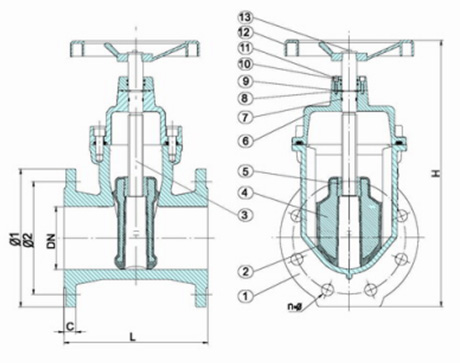Th11 . 06, 2024 11:31 Back to list
control valve
Understanding Control Valves An Essential Component in Process Automation
Control valves play a pivotal role in the automation of various industrial processes. These devices are utilized to regulate the flow, pressure, temperature, and fluid levels within a system, ensuring that operations run smoothly and efficiently. By adjusting the size of the flow passage as directed by a control signal, control valves help maintain the desired set points for various process variables, making them essential in industries like oil and gas, water treatment, chemical processing, and power generation.
How Control Valves Work
At its core, a control valve acts like a gatekeeper in a pipeline, regulating the passage of fluids—liquid or gas. Control valves are generally comprised of three main components the actuator, the positioner, and the valve body. The actuator converts the control signal received from the process control system into mechanical motion, moving the valve stem to either open or close the valve. The positioner helps ensure the valve reaches the correct position by comparing the current valve position to the desired position and providing necessary feedback to the actuator.
Types of Control Valves
Control valves come in various types, each suited for specific applications. The most common types include globe valves, ball valves, butterfly valves, and diaphragm valves. Globe valves are often used for throttling; ball valves are ideal for quick shut-off applications; butterfly valves are popular for large flow applications due to their compact design; and diaphragm valves are suitable for handling corrosive fluids. The choice of valve type depends on factors such as the nature of the fluid, pressure requirements, and the required flow control precision.
control valve

Applications of Control Valves
In the oil and gas industry, control valves are used to manage the flow of crude oil, natural gas, and other hazardous materials, contributing to the safe and efficient operation of refineries and pipelines. In water treatment plants, they help regulate the flow of water through various treatment stages, ensuring the delivery of safe and clean water. Chemical processing plants rely on control valves to maintain the appropriate chemical reactions and mixtures, safeguarding product quality and safety.
The Future of Control Valves
As industries continue to embrace automation and the Internet of Things (IoT), control valves are evolving. The integration of smart technologies allows for improved monitoring, predictive maintenance, and enhanced control over complex processes. The trend towards sustainability and energy efficiency is also pushing the development of more intelligent control systems that can optimize valve operation to reduce waste and improve performance.
In conclusion, control valves are vital components in modern industrial systems, providing essential control over fluid dynamics. Their ability to adapt and their significance in various applications highlight their importance in process automation, making them a subject of ongoing innovation and development in engineering.
Share
-
Reliable Wafer Type Butterfly Valves for Every IndustryNewsJul.25,2025
-
Reliable Flow Control Begins with the Right Ball Check ValveNewsJul.25,2025
-
Precision Flow Control Starts with Quality ValvesNewsJul.25,2025
-
Industrial Flow Control ReliabilityNewsJul.25,2025
-
Engineered for Efficiency Gate Valves That Power Industrial PerformanceNewsJul.25,2025
-
Empowering Infrastructure Through Quality ManufacturingNewsJul.25,2025